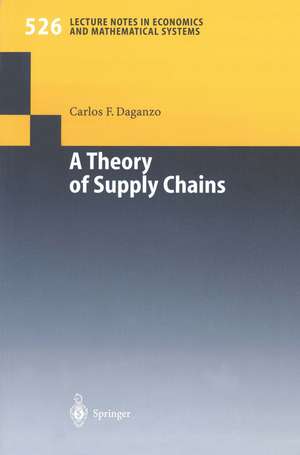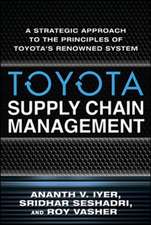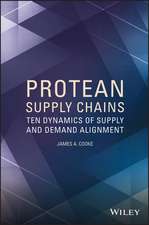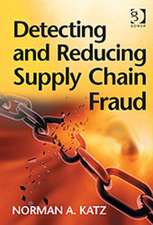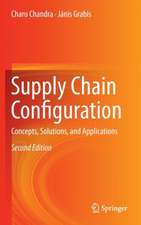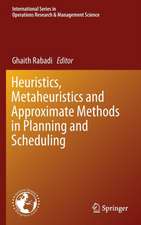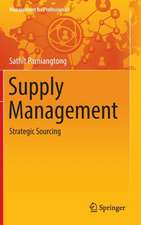A Theory of Supply Chains: Lecture Notes in Economics and Mathematical Systems, cartea 526
Autor Carlos F. Daganzoen Limba Engleză Paperback – 13 feb 2003
Din seria Lecture Notes in Economics and Mathematical Systems
-
 Preț: 360.02 lei
Preț: 360.02 lei -
 Preț: 383.93 lei
Preț: 383.93 lei - 15%
 Preț: 693.39 lei
Preț: 693.39 lei -
 Preț: 384.09 lei
Preț: 384.09 lei -
 Preț: 380.07 lei
Preț: 380.07 lei -
 Preț: 446.26 lei
Preț: 446.26 lei -
 Preț: 497.37 lei
Preț: 497.37 lei -
 Preț: 380.84 lei
Preț: 380.84 lei -
 Preț: 384.86 lei
Preț: 384.86 lei -
 Preț: 378.34 lei
Preț: 378.34 lei -
 Preț: 399.67 lei
Preț: 399.67 lei - 20%
 Preț: 360.93 lei
Preț: 360.93 lei - 15%
 Preț: 643.16 lei
Preț: 643.16 lei -
 Preț: 379.09 lei
Preț: 379.09 lei -
 Preț: 404.76 lei
Preț: 404.76 lei -
 Preț: 385.62 lei
Preț: 385.62 lei - 15%
 Preț: 644.49 lei
Preț: 644.49 lei -
 Preț: 379.09 lei
Preț: 379.09 lei -
 Preț: 345.50 lei
Preț: 345.50 lei -
 Preț: 425.80 lei
Preț: 425.80 lei -
 Preț: 378.34 lei
Preț: 378.34 lei - 18%
 Preț: 775.65 lei
Preț: 775.65 lei -
 Preț: 392.60 lei
Preț: 392.60 lei -
 Preț: 401.61 lei
Preț: 401.61 lei - 15%
 Preț: 646.43 lei
Preț: 646.43 lei -
 Preț: 382.18 lei
Preț: 382.18 lei -
 Preț: 378.34 lei
Preț: 378.34 lei - 15%
 Preț: 637.59 lei
Preț: 637.59 lei - 15%
 Preț: 647.27 lei
Preț: 647.27 lei -
 Preț: 377.73 lei
Preț: 377.73 lei -
 Preț: 447.84 lei
Preț: 447.84 lei - 15%
 Preț: 644.49 lei
Preț: 644.49 lei -
 Preț: 386.00 lei
Preț: 386.00 lei - 15%
 Preț: 654.43 lei
Preț: 654.43 lei -
 Preț: 415.02 lei
Preț: 415.02 lei -
 Preț: 411.54 lei
Preț: 411.54 lei -
 Preț: 398.92 lei
Preț: 398.92 lei -
 Preț: 398.92 lei
Preț: 398.92 lei -
 Preț: 392.75 lei
Preț: 392.75 lei - 15%
 Preț: 635.47 lei
Preț: 635.47 lei - 20%
 Preț: 653.56 lei
Preț: 653.56 lei -
 Preț: 379.86 lei
Preț: 379.86 lei -
 Preț: 495.46 lei
Preț: 495.46 lei -
 Preț: 447.99 lei
Preț: 447.99 lei -
 Preț: 378.71 lei
Preț: 378.71 lei - 15%
 Preț: 637.13 lei
Preț: 637.13 lei -
 Preț: 385.84 lei
Preț: 385.84 lei -
 Preț: 378.54 lei
Preț: 378.54 lei - 15%
 Preț: 666.55 lei
Preț: 666.55 lei
Preț: 380.07 lei
Nou
Puncte Express: 570
Preț estimativ în valută:
72.73€ • 77.77$ • 60.64£
72.73€ • 77.77$ • 60.64£
Carte tipărită la comandă
Livrare economică 17 aprilie-01 mai
Preluare comenzi: 021 569.72.76
Specificații
ISBN-13: 9783540002888
ISBN-10: 354000288X
Pagini: 136
Ilustrații: VIII, 125 p.
Dimensiuni: 155 x 235 x 7 mm
Greutate: 0.23 kg
Ediția:2003
Editura: Springer Berlin, Heidelberg
Colecția Springer
Seria Lecture Notes in Economics and Mathematical Systems
Locul publicării:Berlin, Heidelberg, Germany
ISBN-10: 354000288X
Pagini: 136
Ilustrații: VIII, 125 p.
Dimensiuni: 155 x 235 x 7 mm
Greutate: 0.23 kg
Ediția:2003
Editura: Springer Berlin, Heidelberg
Colecția Springer
Seria Lecture Notes in Economics and Mathematical Systems
Locul publicării:Berlin, Heidelberg, Germany
Public țintă
ResearchCuprins
1. Introduction.- 1.1 The problem.- 1.2 Terminology and data representation.- 2. Algorithms I Policies.- 2.1 The canonical form: order-based and inventory-based policies.- 2.2 Examples.- 2.3 Anticipative (commitment-based) policies.- 2.4 Flexible commitment policies.- 2.5 Policies for queuing systems and traffic flow.- 3. Algorithmic Properties.- 3.1 Properness.- 3.2 Steady-state properties.- 4. Stability and Monotonicity Requirements.- 4.1 Types of stability.- 4.2 Stability analysis.- 4.3 Interpretation and examples.- 4.4 Some additional properties of linear, order-based policies.- 4.5 Duality: Serial queues and “push chains”.- 5. Strongly Stable Policies: The Act Method.- 5.1 The kinematic wave target.- 5.2 Discrete-time approximations of the KW target.- 6. Cost Estimation and Optimization.- 6.1 Autonomous user-optimal operation with flexible commitments.- 6.2 Coordinated “system-optimum” operation: Optimization.- 7. Discussion.- 7.1 Extensions: Multi-commodity networks.- 7.2 Application issues.- References.- Appendix A: Stability via Control Theory.- Appendix B: Kinematic Wave Theory Revisited.- B.1 Preliminaries.- B.2 The KW Theory Revisited.- B.3 Properties of the procedure.
